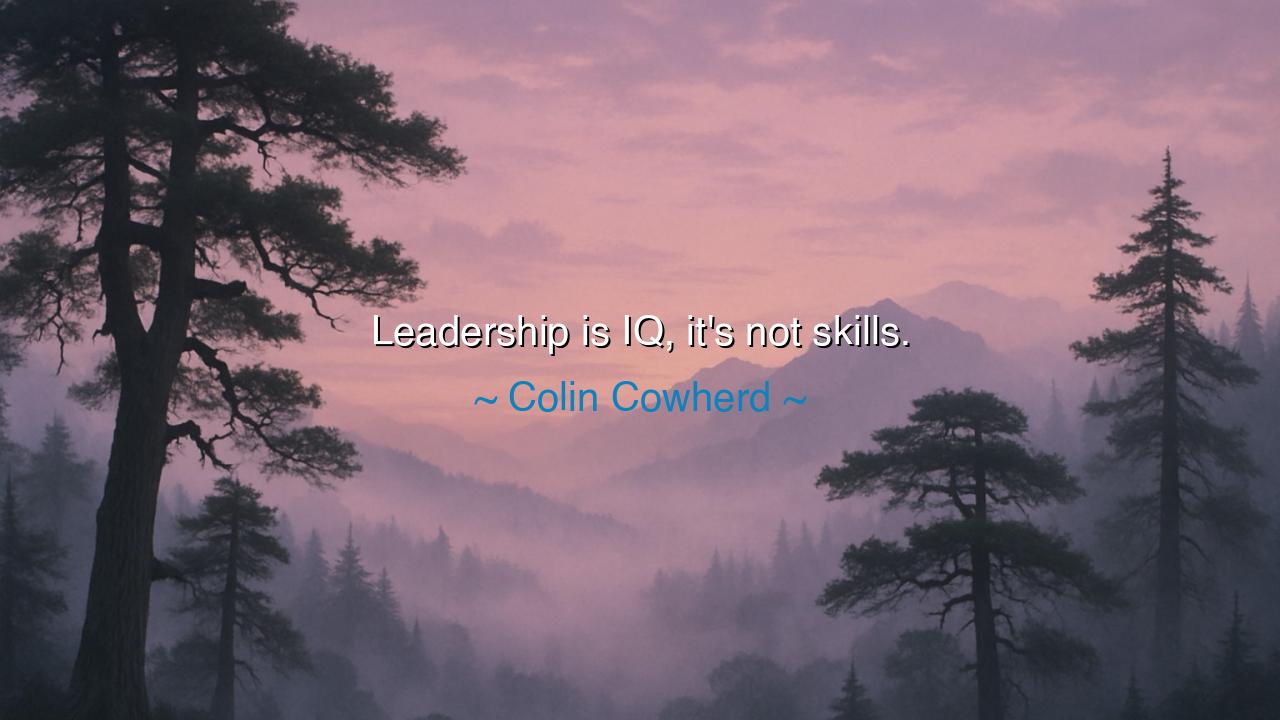
Leadership is IQ, it's not skills.






The words of Colin Cowherd cut to the marrow of command: “Leadership is IQ, it’s not skills.” In this brief yet piercing statement, he draws a line between mere ability and the higher faculty of vision. Skills are the tools in a man’s hands—useful, necessary, but limited to their craft. IQ, the power of intellect and understanding, is the light in the mind that sees not only the task before him but the road ahead, the storm gathering, the opportunities hidden in shadow. Cowherd reminds us that a leader is not crowned by how many tasks he can perform, but by the wisdom with which he discerns what must be done.
For what is leadership if not the mastery of decision? A man of great skill may fight bravely on the battlefield, or build with his hands the most intricate works, yet still lack the clarity to guide others. Leadership demands foresight—the ability to recognize patterns, to anticipate outcomes, to weigh dangers and possibilities. Skills can be taught; vision cannot be so easily given. Thus Cowherd equates leadership with intellect, with the capacity to think beyond the present moment, to hold in the mind a map of what is unseen.
Consider the example of Alexander the Great. He was not the strongest warrior in his armies, nor the most skilled swordsman among his men. Yet he possessed an intelligence so fierce that it bent the world. He saw how to outflank larger armies, how to inspire loyalty across cultures, how to weave conquest into empire. His skills were few compared to the thousands who served him, but his IQ, his genius for strategy and vision, made him a leader of empires. Here we see the truth of Cowherd’s words: skills may win a duel, but intellect wins the world.
The same truth is revealed in the story of Winston Churchill. By his own admission, he was clumsy in school, uneven in his studies, and lacked the polish of his peers. But in the hour of Britain’s greatest peril, his mind, sharp and unyielding, recognized the nature of the enemy and the courage needed to resist. His leadership did not rest on technical skill—he was no general commanding armies by hand—but on the brilliance of his insight and the power of his voice, born of intellect, to see clearly what others dared not. Through mind, not skill, he became the bulwark of a nation.
This is not to scorn skills, for they are the foundation upon which societies stand. But Cowherd speaks to the higher calling: that to lead is not merely to perform, but to perceive. The blacksmith may forge iron, the farmer may till soil, the soldier may march—but it is the leader who must discern where the blacksmith’s weapons are needed, when the farmer’s harvest must be gathered, and how the soldier’s march shall turn the tide. The skills are many; the intellect that guides them is one.
The lesson for us is profound: if we would lead, we must cultivate not only our abilities but our intelligence—our capacity to analyze, to plan, to judge rightly. Read deeply, think broadly, and train your mind to see patterns where others see only chaos. Do not rely solely on what your hands can do, but sharpen what your mind can perceive. For it is not the most skilled who commands the room, but the one whose understanding lifts others above their limits.
Therefore, O seeker of wisdom, take these words to heart: skills may win you work, but intellect wins you followers. Skills may build your craft, but intellect builds your legacy. Cultivate the IQ of leadership, the vision that discerns, the clarity that directs, and the courage that decides. For in the end, it is not the strongest hand that rules, but the sharpest mind. And when mind and spirit are joined, leadership shines like a beacon, guiding others through storm and darkness toward the dawn.






AAdministratorAdministrator
Welcome, honored guests. Please leave a comment, we will respond soon